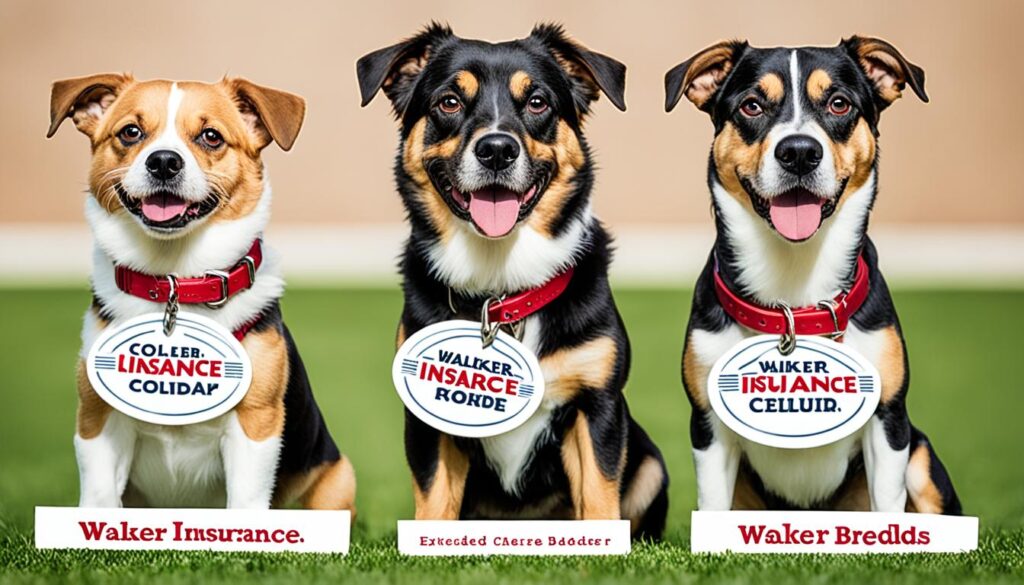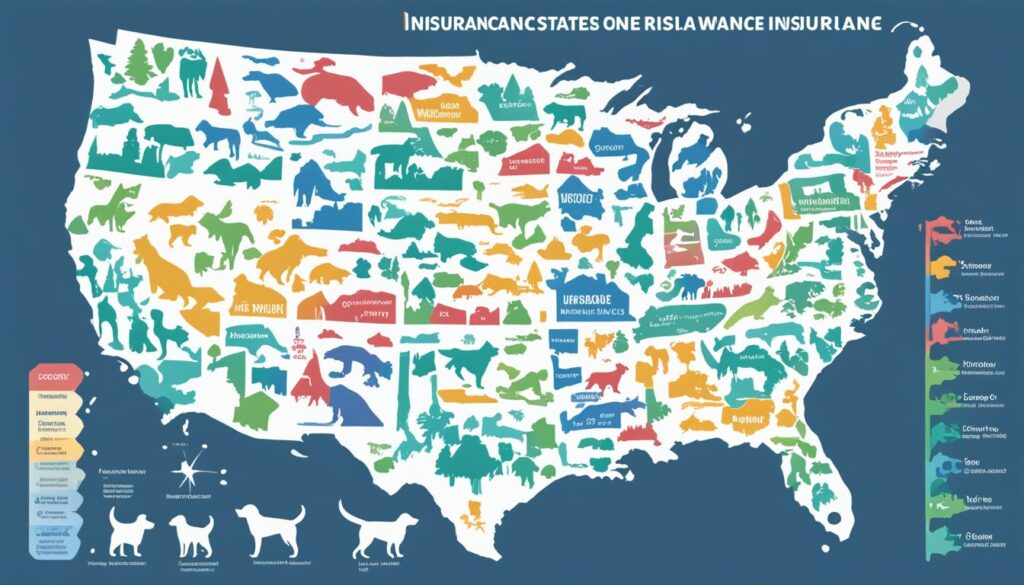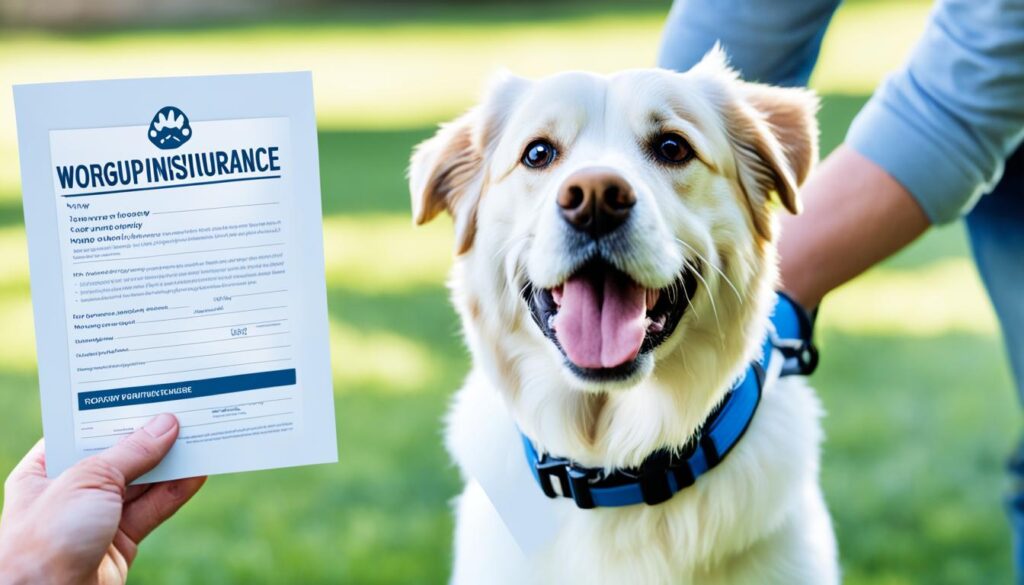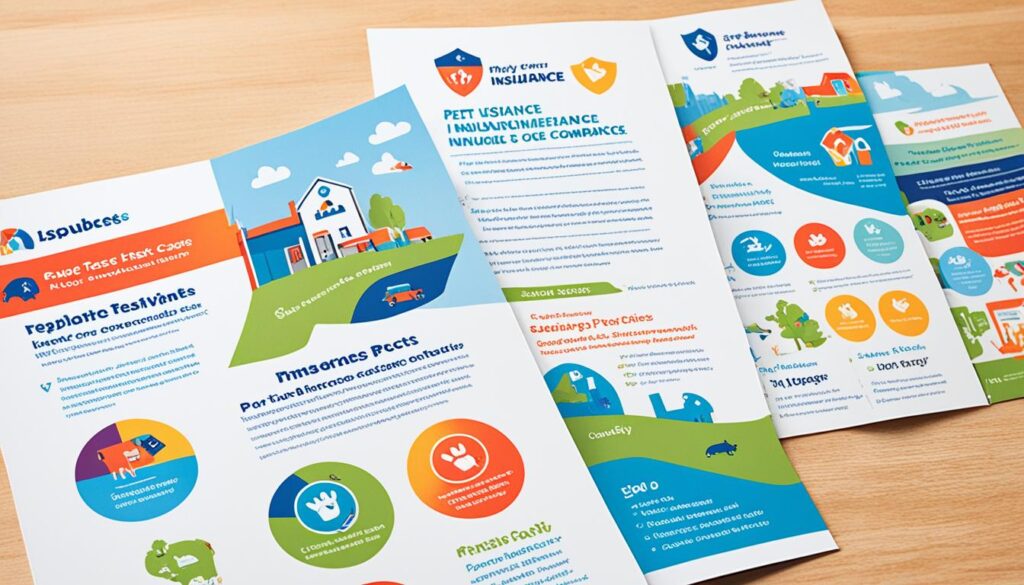According to the 2015-2016 National Pet Owners Survey, 65% of US households own a pet. Almost 78 million of those pets are dogs. Dog bites lead to nearly 4.5 million incidents a year, with one-fifth needing medical help. As a dog walker, it’s key to know about insurance to protect your business and clients.
Key Takeaways
- Dog walker insurance is key for protecting against risks like dog bites and property damage.
- It covers injuries to others and damage to property. It also covers vet bills for dogs you care for.
- Employee dishonesty coverage (bonding) helps protect against theft or bad behavior by staff.
- Insurance costs for dog walkers change based on location, coverage limits, and past claims.
- Some dog breeds might not be covered or need extra steps, like training and spaying/neutering proof.
The Importance of Dog Walker Insurance
Starting a dog walking or pet sitting business is rewarding but risky. Dog walkers face dangers like pet injuries, property damage, and claims from others. General liability insurance is key to protect them from these risks. Without it, dog walkers could face huge bills for medical care, legal fees, and damages, threatening their business.
Risks Faced by Dog Walkers
Dog walkers deal with many risks every day, including:
- Pet injuries or illnesses
- Property damage caused by dogs
- Third-party claims, such as dog bites or accidents
- Loss or theft of client property or keys
Reasons to Have Insurance as a Dog Walker
Insurance for dog walkers offers many benefits, like:
- Financial protection – It covers medical bills, legal fees, and other costs from incidents, keeping the dog walker’s personal assets safe.
- Professionalism and trust – Having insurance shows the dog walker’s dedication to their clients and the pets they care for.
- Peace of mind – Insurance gives dog walkers and their clients confidence that they’re protected if something unexpected happens.
In the dog walking world, having a good reputation and trust with clients is key. With the right insurance, dog walkers can protect their business, clients, and pets. This lets them focus on giving top-notch service.
General Liability Insurance for Dog Walkers
As a dog walker, it’s key to protect your business from liability risks. General liability insurance is vital. It shields your business from accidental injuries, property damage, or claims that could harm your reputation. This coverage helps pay for medical bills, legal fees, and settlements, keeping your business safe from financial loss.
What Does General Liability Cover?
General liability insurance for dog walkers offers important protections:
- Bodily Injury Liability: Covers medical costs if a dog you’re walking bites or hurts someone.
- Property Damage Liability: Protects you if a dog damages a client’s property while you’re watching it.
- Personal and Advertising Injury Liability: Covers claims of libel, slander, or other harm to your reputation.
It’s key to know what your general liability policy covers. Coverage can differ between insurance companies. Some policies might not cover certain high-risk dog breeds or incidents. Always check the details carefully.
“The average dog bite claim has been around $44,760 according to the Insurance Information Institute.”
Dog bites are a big liability risk for dog walkers. Over 17,000 dog bite claims are filed each year, says the Insurance Information Institute. Insurers may change your premiums based on how many dogs you walk, the breeds, and how often you walk them.

General liability coverage shields dog walking businesses from unexpected incidents. It gives you peace of mind and lets you focus on great service for your canine clients. Knowing what your coverage includes helps make sure your business is well-protected.
Pet Protection and Veterinary Reimbursement
As a dog walker, taking great care of the pets is key. Many insurance plans for dog walkers include pet protection and veterinary reimbursement. These benefits help keep your furry clients safe and healthy.
Pet Protection Coverage: This coverage helps pay for vet bills if a dog gets hurt or has an accident while in your care. It shows the insurance company cares about the pets you look after.
Veterinary Reimbursement: This part of the coverage can pay you back for vet costs for a client’s pet, even if it wasn’t your fault. It protects your business and the pets you care for, letting you focus on giving great service without worrying about unexpected costs.
Having pet protection insurance for dog walkers and veterinary reimbursement for dog walkers is crucial. It shows the insurance company’s commitment to the pets’ well-being. This gives you and your clients peace of mind.
“Comprehensive pet protection and veterinary reimbursement coverages are essential for dog walkers, as they provide a safety net for the animals in our care and the business owners who serve them.”
Employee Dishonesty Coverage (Bonding)
As a dog walker, it’s key to protect your business from theft or fraud claims by employees. This is where employee dishonesty coverage, or bonding, comes in. It’s a part of dog walker insurance that protects against claims of missing or damaged items from your clients.
Bonding is like a financial promise. It covers claims if a client’s items go missing while their pets are with your business. This coverage keeps your reputation safe and shows you care about your clients’ things.
The main perks of employee dishonesty coverage for dog walkers are:
- It shields your business from theft or fraud claims by employees
- It pays clients back for missing or damaged items
- It makes your dog walking services more trustworthy
Adding employee dishonesty coverage (bonding) to your insurance means you’re ready for theft and fraud risks. It helps make your business stronger and more reliable in the industry.
| Coverage | Description | Benefits |
|---|---|---|
| Employee Dishonesty (Bonding) | Protects the dog walking business from allegations of theft or fraud by employees |
|

“Bonding is a critical component of dog walker insurance, providing financial protection against the risks of theft and fraud by employees. It helps to build trust and credibility with clients, ensuring their valuable belongings are safe in the hands of your dog walking business.”
Major Pet Sitting Insurance Providers
Choosing the right pet sitting insurance is key for your dog walking business. Many top providers in the U.S. offer coverage for pet care pros. This includes general liability, pet protection, and employee dishonesty coverage. Let’s look at some top pet sitting insurance providers and what they offer.
Business Insurers of the Carolinas
Business Insurers of the Carolinas is a top choice for dog walker insurance and pet sitting businesses. They have a wide range of coverage, like general liability, pet injury, and veterinary reimbursement, and employee dishonesty. Over 10,000 pet-care pros trust them for top dog walker insurance solutions.
Pet Sitters Associates
Pet Sitters Associates is a big name in pet sitting insurance providers. They offer special coverage for pet sitters, dog walkers, and other pet care pros. You can get general liability, pet protection, and bonding insurance with them. They’re known for great customer service and tailored policies.
Kennel Pro
Kennel Pro is a well-known dog walker insurance company. They have a variety of insurance products for pet-care businesses. Their policies include general liability, pet injury coverage, and equipment and inventory protection. Kennel Pro’s coverage is made for dog walkers, pet sitters, and other pet-related service providers.
Pet Care Insurance
Pet Care Insurance focuses on insurance for the pet care industry. They offer pet sitting insurance packages with general liability, pet injury, and veterinary reimbursement, and employee dishonesty coverage. Pet Care Insurance is known for competitive rates and personalized support for dog walker insurance customers.
When picking a pet sitting insurance provider, dog walkers and pet sitters should look at coverage options, policy limits, and customer service. This will help them find the best fit for their business.
| Provider | General Liability | Pet Protection | Veterinary Reimbursement | Bonding |
|---|---|---|---|---|
| Business Insurers of the Carolinas | $2,000,000 yearly limit, $1,000,000 per incident | $5,000 yearly limit, $2,500 per incident | $2,500 yearly limit, $1,000 per incident | Coverage available |
| Pet Sitters Associates | $2,000,000 yearly limit, $1,000,000 per incident | $5,000 yearly limit, $2,500 per incident | $2,500 yearly limit, $1,000 per incident | Coverage available |
| Kennel Pro | $2,000,000 yearly limit, $1,000,000 per incident | $5,000 yearly limit, $2,500 per incident | $2,500 yearly limit, $1,000 per incident | Coverage available |
| Pet Care Insurance | $2,000,000 yearly limit, $1,000,000 per incident | $5,000 yearly limit, $2,500 per incident | $2,500 yearly limit, $1,000 per incident | Coverage available |
The table shows a comparison of coverage limits from some top pet sitting insurance providers in the U.S. Dog walkers and pet sitters should check these details to make sure they get the right policy for their business.
“Trusted by over 10,000+ Pet-care Professionals and rated 4.9/5 stars, these pet sitting insurance providers offer comprehensive coverage solutions for dog walkers and pet sitters.”
Cost of Dog Walker Insurance
The cost of dog walker insurance varies a lot. It depends on where you are, how big your business is, and how much coverage you need. On average, it costs between $250 and $500 a year.
But, the cost of not having insurance can be much higher. This includes things like pet injuries or damage to property. It’s smart to get quotes from different companies to find the best deal. The right policy can protect your business financially.
| Location | Average Monthly Cost for Dog Insurance | Average Monthly Cost for Cat Insurance |
|---|---|---|
| Houston, TX | $18.60 – $26.08 | $15.99 |
| Seattle, WA | Up to $37.85 | N/A |
| Phoenix, AZ | $22.83 | N/A |
| Los Angeles, CA | $27.54 | N/A |
When planning your dog walker insurance budget, think about the pets you care for. Their breed, age, and health can affect the cost. Also, extra coverage like pet protection and veterinary reimbursement can increase the price.
To get the best deal on cost of dog walker insurance, compare quotes from several trusted providers. This way, you can find a policy that offers great protection without breaking the bank for your pet sitting business.

“The right insurance policy can provide essential financial protection for your dog walking business.”
Tips for Choosing the Right Insurance
When picking the right insurance for your dog walking business, think about a few key things. First, make sure the policy covers general liability and bonding for employee dishonesty. This keeps your business safe from claims about injuries, damage, and employee theft or wrongdoings.
It’s also crucial to check that the coverage limits fit your business needs and the policy has few exclusions. Look over the policy to know what’s covered and what’s not. A policy with high limits and few exclusions offers good protection if you face a claim.
Lastly, look into the insurance company’s reputation and customer service. A good company can help a lot with claims, offering support and advice when you need it. Getting quotes from several companies and reviewing their policies carefully helps you pick the best one for your business.
- Ensure the policy includes both general liability and bonding (employee dishonesty) coverage
- Verify that the coverage limits meet the business’s needs and the policy has minimal exclusions
- Research the insurance provider’s reputation and customer service capabilities
- Obtain multiple quotes and thoroughly review the policy details
By keeping these points in mind, dog walkers can find the right insurance. This protects their business, their clients, and their furry friends.
“Choosing the right insurance is essential for any dog walking business. It provides the necessary protection and peace of mind to operate with confidence.”
– Mark Fitzpatrick, Insurance Specialist
| Factors to Consider | Importance |
|---|---|
| General Liability Coverage | Protects against claims related to injuries or property damage |
| Employee Dishonesty (Bonding) Coverage | Covers any potential theft or misconduct by employees |
| Adequate Coverage Limits | Ensures the policy meets the business’s needs |
| Minimal Exclusions | Minimizes gaps in coverage |
| Insurer Reputation and Customer Service | Provides support and guidance during the claims process |
Other Types of Insurance to Consider
Comprehensive dog walker insurance is key for your pet care business. But, don’t forget to look into other types of coverage too. Worker’s compensation, commercial auto insurance, and umbrella policies can offer important protection for your business, workers, and clients.
Worker’s Compensation Insurance
As a dog walking business, you need to protect your employees from on-the-job injuries. Worker’s compensation insurance covers medical bills and lost wages if an employee gets hurt. It makes sure your business follows the law and helps your staff financially if they get injured.
Commercial Auto Insurance
If you use cars to move pets, you must have commercial auto insurance. It protects your business if there’s an accident with your work vehicles. This includes costs for damage to property, injuries, and more. Having this insurance gives you peace of mind and keeps your business safe from big financial losses.
Umbrella Policies
An umbrella policy adds an extra layer of protection to your insurance. It covers any gaps in your current insurance and offers higher liability limits. This is great for pet care professionals who want full coverage for their work.
Think about the risks and needs of your dog walking business to pick the right insurance. Talking to an experienced insurance broker can help you find the best coverage for your business, employees, and clients.

what dog breeds are not covered by homeowners insurance
Some dog breeds are not covered by standard homeowners insurance. This is because they are seen as more likely to be aggressive and cause harm. Breeds like pit bulls, Rottweilers, German shepherds, and Doberman pinschers are often banned or restricted. Insurance companies may not cover homes with these dogs or charge much higher premiums.
Industry data shows that certain breeds are often on the list of restricted dogs: Akitas, Chow chows, Doberman pinschers, German shepherds, Huskies, Mastiffs, Pit bulls, Presa Canarios, Rottweilers, Staffordshire terriers, and Wolf hybrids. If a homeowner doesn’t tell the insurer about the dog or lies about it, they can be refused coverage.
So, dog walkers with these breeds need to look for special insurance policies. Traditional homeowners or general liability insurance might not cover them. Companies like AIG, Chubb, Hippo, and Encompass offer coverage for even the most dangerous breeds where others don’t.
It’s crucial for dog walkers to know about insurance exclusions for certain dog breeds. They should make sure they have the right coverage to protect themselves and their clients. By looking into different insurance options, dog walkers can find the best coverage for their needs and the dogs they care for.
“If a dog is not on the homeowners insurance dog breed restrictions list, it is typically covered by the policy; however, if the dog is on the list or excluded from coverage specifically, it will not be covered.”
Breed-Specific Legislation and Insurance Exclusions
When looking into dog walker insurance, both pet owners and professionals face a complex situation. Many places have laws that limit or ban certain dog breeds. Insurance companies often use these laws to deny coverage or add extra rules.
There’s a lot of debate about how breed-specific laws and insurance exclusions affect people. Some say these rules unfairly target communities of color and those with less money. Insurance companies argue they look at bite severity, media impact, and past claims to set breed restrictions.
For dog walkers in areas with breed-specific laws, knowing about insurance risks is key. Certain breeds like pit bulls, Rottweilers, and Doberman Pinschers are often not covered by homeowners or liability policies. This leaves dog walkers at risk of big financial losses.
| Dog Breed | Percentage of Insurers Banning the Breed |
|---|---|
| Pit Bull | 100% |
| Doberman Pinscher | 100% |
| Rottweiler | 100% |
| Chow Chow | 95% |
| Wolf Dog/Hybrid | 93% |
| Presa Canario | 86% |
| Caucasian Shepherd | 24% |
To avoid these risks, dog walkers should look into different insurance options. They need to make sure they have the right coverage to protect their business and the pets they care for. This might mean finding specialized policies or working with insurers that don’t exclude certain breeds.
By understanding how breed-specific laws and insurance work together, dog walkers can make smart choices. They can take steps to protect their business and the animals they look after.

“Insurance advocates suggest there’s a correlation between certain dog breeds and perceptions of the communities who own them, particularly with pit bulls and the Black community.”
Getting Insured as a Dog Walker in Different States
The need for insurance for dog walkers changes with each state. In California, every worker, whether an employee or a freelancer, must have insurance. Dog walkers in California should look into different insurance options. They should pick a policy that covers general liability, pet protection, and employee dishonesty.
The cost of dog walking insurance in California varies from $140 to $600 a year. This depends on the provider, coverage limits, and the business’s needs. Dog walkers should know the state’s rules and talk to insurance providers to make sure they’re covered and follow the law.
Dog Walker Insurance in California
In California, dog walkers need the right insurance to protect themselves, their clients, and the pets they care for. This includes:
- General Liability Insurance: This coverage protects the dog walker if someone gets hurt or if property gets damaged because of the animals they watch.
- Pet Protection and Veterinary Reimbursement: This coverage helps pay for vet bills if a pet gets hurt while the dog walker is watching it.
- Employee Dishonesty Coverage (Bonding): This coverage protects the dog walker’s clients if any of their employees steal or act dishonestly.
With the right insurance, dog walkers in California can run their businesses with peace of mind. They’ll be safe from the risks of their job.
“Proper insurance coverage is essential for dog walkers in California to safeguard their business and clients. The state’s regulations require a comprehensive approach to risk management.”
Insurance needs for dog walkers differ across states. It’s important for those in this field to check their local laws and work with trusted insurance providers. This ensures they’re fully protected.

Pet Insurance for Your Own Dog
As a dog walker, you know how important it is to protect the pets you care for. But, it’s also key to think about getting pet insurance for your own dog. Unexpected vet bills can pile up fast. Having pet insurance can help cover these costs, giving you peace of mind.
By getting pet insurance for your own dog, you make sure your pet gets the care they need. It also shows you care about all pets, including your own. This protects your dog walking business and proves you value the health and safety of all pets.
Choosing the right pet insurance plan is crucial. Look at coverage, deductibles, and monthly costs. For example, Lemonade offers plans from $26.31/mo to $71.74/mo. These plans come with a 90% reimbursement and cover up to unlimited annually.
The cost of pet insurance varies by dog breed. A Chihuahua might cost about $16.37/mo, while a Golden Retriever could be $38.44/mo, and a German Shepherd $40.62/mo. By comparing different options, you can find the best policy for your dog and your budget.
“Vet bills can easily exceed $10,000, potentially leading to tough decisions for uninsured pet owners. Having pet insurance can provide the financial protection you need to ensure your furry friend receives the best possible care.”
Getting pet insurance for your dog protects your pet and shows you care for all animals, including those you walk. This step ensures your dog gets the care they need. It also gives peace of mind for your clients and your business.

Resources for Finding Local Pet Insurance Companies
As a dog walker, it’s key to get the right insurance for your business. Luckily, there are many resources to help you find local pet insurance companies. These tools let you compare different insurers’ offerings, coverage, and reputations. This way, you can pick a policy that fits your needs and your state’s laws.
One great resource is The Swiftest’s interactive map and directory. It lets you search for pet insurance in your state or area. You’ll find info on their services, coverage, and what customers think. This is super useful when you’re looking for the right insurance for your dog walking business.
Industry associations and professional groups are also great for dog walkers. They often have lists of recommended insurance providers. These lists include extra details and advice on what coverage you need. Joining these groups can help you find trustworthy insurance companies in your area.
The cost of pet insurance can change a lot, depending on the dog’s breed, age, and where you live. For example, Labradors cost about $37.50 a month on average, while Chihuahuas are around $16.37. By researching local providers, you can find a policy that fits your budget and covers your needs.
“Investing in proper pet insurance can make all the difference when unexpected medical emergencies arise, ensuring your furry clients receive the care they need without leaving you with crippling vet bills.”
Whether you’re experienced or new to dog walking, it’s smart to look into the resources available. Finding the right local pet insurance company can give you peace of mind and protect your business financially.

Conclusion
Dog walker insurance is key for any pro in pet care. It shields their business from risks like pet injuries, damage to property, and issues with employees. The right policy covers general liability, pet protection, and bonding, offering financial safety and peace of mind.
It’s also smart to think about breed-specific laws and insurance for your own pets. This helps a dog walking business manage risks better. By picking the right insurance, dog walkers can focus on great care for their clients and keep their business strong.
The importance of dog walker insurance, key takeaways for pet care professionals, and protecting dog walking businesses with the right insurance are vital. They help dog walkers deal with challenges and risks, leading to success and stability in the long run.


The Real Person!
Author X22Jek acts as a real person and passed all tests against spambots. Anti-Spam by CleanTalk.
Hey people!!!!!
Good mood and good luck to everyone!!!!!
The Real Person!
Author HarveyAwact acts as a real person and passed all tests against spambots. Anti-Spam by CleanTalk.
0daymusic serves as a global platform for disseminating exclusive music to Radio DJs, Club DJs.
Music private service list: https://0daymusic.org/FTPtxt/
Server’s capacity: 418 TB MP3, FLAC, Labels, LIVESETS, Music Videos.
Support FTP, FTPS (File Transfer Protocol Secure), SFTP and HTTP, HTTPS.
More 16 years Of archives.
Easy to use: Most of genres are sorted by days.
The Real Person!
Author newest_ziKr acts as a real person and passed all tests against spambots. Anti-Spam by CleanTalk.
best gambling games to win money [url=http://24bet-casino.com/]http://24bet-casino.com/[/url] .
The Real Person!
Author new_zesr acts as a real person and passed all tests against spambots. Anti-Spam by CleanTalk.
Experience the Thrill of New UK Online Casinos
casino slots uk [url=http://www.casinoroyal-online.com/casino-reviews/uk-casinos]casino slots uk[/url] .
The Real Person!
Author wedding_vsKt acts as a real person and passed all tests against spambots. Anti-Spam by CleanTalk.
Unique and personalized wedding experiences, book your perfect wedding with us now.
best wedding photographers and videographers near me [url=https://bestweddingcinema.com/]https://bestweddingcinema.com/[/url] .
The Real Person!
Author all_edSl acts as a real person and passed all tests against spambots. Anti-Spam by CleanTalk.
Play and Win Now!
australian online slots casino [url=https://www.wolfgames-online.com/casino-reviews/australian-casinos]australian online slots casino[/url] .
The Real Person!
Author rent_lgEa acts as a real person and passed all tests against spambots. Anti-Spam by CleanTalk.
Choose a car for rent at a profit, convenient rental conditions.
The Real Person!
Author newest_wyOa acts as a real person and passed all tests against spambots. Anti-Spam by CleanTalk.
alchemy fortunes casino game [url=https://casinowild24.com/all-games/slots/africa-goes-wils/]https://casinowild24.com/all-games/slots/africa-goes-wils/[/url].
The Real Person!
Author rent_nmoa acts as a real person and passed all tests against spambots. Anti-Spam by CleanTalk.
How to rent a car in advance, the advantages and disadvantages of renting a car in advance, and how it will help you on your trip to avoid inconveniences on the spot to plan a carefree vacation .
The Real Person!
Author blackjack_ttEt acts as a real person and passed all tests against spambots. Anti-Spam by CleanTalk.
video poker games for free [url=https://www.casinowild-24.com/free-casinos/free-video-poker/]video poker games for free[/url] .
The Real Person!
Author Husam Orabi acts as a real person and passed all tests against spambots. Anti-Spam by CleanTalk.
Hello,
I am Husam Orabi, Qatari Investors Group’s chief business development and delivery officer. We offer loans and credit facilities at a small interest rate for ten years and a moratorium of up to two years.
We also finance profit-oriented projects and businesses. We understand that each business is unique, so let us know what you need for your business, and we will tailor our financing to suit your specific requirements.
Regards,
Husam Orabi
CHIEF BUSINESS DEVELOPMENT & DELIVERY OFFICER
Mobile: +971524239312
Whatsapp: +971524239312
husam@qatarinvestors-group.com
The Real Person!
Author casino_nbSr acts as a real person and passed all tests against spambots. Anti-Spam by CleanTalk.
best live casino online [url=https://www.casinope-online.com/casino-reviews/live-casinos/]best live casino online[/url] .
The Real Person!
Author distribyut_iqsa acts as a real person and passed all tests against spambots. Anti-Spam by CleanTalk.
Выгодные предложения на технику Microsoft, сделают вашу покупку приятной.
разработка приложений на microsoft [url=https://www.best-lip-filler.com/]https://www.best-lip-filler.com/[/url] .
The Real Person!
Author user-068156 acts as a real person and passed all tests against spambots. Anti-Spam by CleanTalk.
awesome
The Real Person!
Author double_afol acts as a real person and passed all tests against spambots. Anti-Spam by CleanTalk.
Innovative technologies in the production of double glazed windows in Melbourne
affordable doors and windows [url=http://www.bestnosefiller.com]http://www.bestnosefiller.com[/url] .
The Real Person!
Author Rickydek acts as a real person and passed all tests against spambots. Anti-Spam by CleanTalk.
Unlock unprecedented business potential, Access a comprehensive database of 750 million LinkedIn expert users , segmented by country. Phone numbers, email addresses, Facebook, Twitter profiles included, LinkedInData
Contacts:
https://www.linkedin.com/in/anatoliy-barsukov-52194bb4/
Tel/Viber/WhatsApp:
+79818525114
Skype anato27
The Real Person!
Author Lineage_zupa acts as a real person and passed all tests against spambots. Anti-Spam by CleanTalk.
Immerse yourself in the world of Lineage 2 on servers
Lineage 2 Interlude servers [url=cryptoexlicense.com/chronicle/lineage-2-interlude]cryptoexlicense.com/chronicle/lineage-2-interlude[/url] .
The Real Person!
Author primer-1 acts as a real person and passed all tests against spambots. Anti-Spam by CleanTalk.
primer-8
The Real Person!
Author Üsküdar tesisat arıza tespiti acts as a real person and passed all tests against spambots. Anti-Spam by CleanTalk.
Üsküdar tesisat arıza tespiti Kırmadan su kaçağını bulup onardılar. Kaliteli hizmet! http://www.kuaixin.net/read-blog/37
The Real Person!
Author domestic_jkMa acts as a real person and passed all tests against spambots. Anti-Spam by CleanTalk.
Why are domestic animals so important, why domestic animals have become so popular.
what to consider when choosing a pet, which pet breed is right for you.how to ensure comfort and care for pets, how to create a pet’s diet.what you didn’t know about pets, why people adore pets.effective methods of pet training, how to teach a parrot to talk.
domestic animals meaning [url=http://www.petstorepetsupply.com/index.php/2024/06/22/creating-a-wildlife-friendly-garden/]http://www.petstorepetsupply.com/index.php/2024/06/22/creating-a-wildlife-friendly-garden/[/url] .
The Real Person!
Author JamesZerge acts as a real person and passed all tests against spambots. Anti-Spam by CleanTalk.
vtkqj3vk4tuqjhwejhqw – yourinsurancediscount.com
https://Zenaltetcen.info